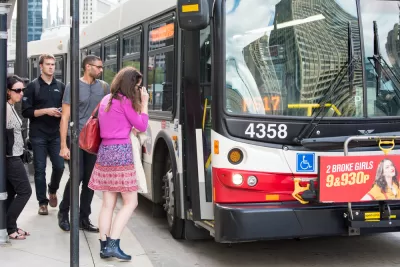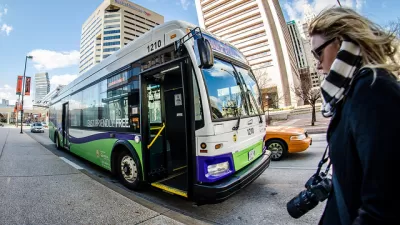Despite a preference among policymakers for high-tech transit solutions, the humble bus, with the right infrastructure and funding, has the potential to be the heart of a comprehensive, reliable, and cost-effective transit system.

"Buses are hard to love," writes Farhad Manjoo in the New York Times, but with over 4.6 billion trips made by bus per year, they're really the workhorses of the American public transit system. Despite a growing focus on high-tech solutions like autonomous vehicles and high-speed rail, Manjoo argues, investing in buses can make a big, almost-immediate impact on the experience of transit riders. "With the proper investment, city buses might be transformed into the sort of next-generation transportation service that technology companies and car companies have spent billions over the last decade trying to build — a cheap, accessible, comfortable, sustainable, reliable way to get around town."
According to Manjoo, "all we’ve got to do is buy more buses, hire more bus drivers and, in some places, give buses special privileges on the road. All we’ve got to do is care enough to build bus systems that work." When given priority on roads, buses can be the faster, more convenient option than private cars or even subways. London's transit system provides one example of an effective bus network. What makes London's bus system work so well, writes Manjoo, is scale: "there are simply enough buses in London to allow for frequent, reliable service to the parts of the city that people want to travel to."
But despite their advantages, bus transit doesn't see a lot of support in policy circles. Simply put, "bus riders wield little political or economic clout; a disproportionate number are people with low incomes." Yet bus transit is cheap and efficient. According to the Urban Institute, "for about $17 billion annually, every American city with at least 100,000 people could more than double its transit capacity."
FULL STORY: We Need Buses, Buses Everywhere

Planetizen Federal Action Tracker
A weekly monitor of how Trump’s orders and actions are impacting planners and planning in America.

Congressman Proposes Bill to Rename DC Metro “Trump Train”
The Make Autorail Great Again Act would withhold federal funding to the system until the Washington Metropolitan Area Transit Authority (WMATA), rebrands as the Washington Metropolitan Authority for Greater Access (WMAGA).

The Simple Legislative Tool Transforming Vacant Downtowns
In California, Michigan and Georgia, an easy win is bringing dollars — and delight — back to city centers.

The States Losing Rural Delivery Rooms at an Alarming Pace
In some states, as few as 9% of rural hospitals still deliver babies. As a result, rising pre-term births, no adequate pre-term care and "harrowing" close calls are a growing reality.

The Small South Asian Republic Going all in on EVs
Thanks to one simple policy change less than five years ago, 65% of new cars in this Himalayan country are now electric.

DC Backpedals on Bike Lane Protection, Swaps Barriers for Paint
Citing aesthetic concerns, the city is removing the concrete barriers and flexposts that once separated Arizona Avenue cyclists from motor vehicles.
Urban Design for Planners 1: Software Tools
This six-course series explores essential urban design concepts using open source software and equips planners with the tools they need to participate fully in the urban design process.
Planning for Universal Design
Learn the tools for implementing Universal Design in planning regulations.
Smith Gee Studio
City of Charlotte
City of Camden Redevelopment Agency
City of Astoria
Transportation Research & Education Center (TREC) at Portland State University
US High Speed Rail Association
City of Camden Redevelopment Agency
Municipality of Princeton (NJ)





























